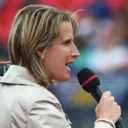Full-timepublished at 21:06 GMT 24 March 2017
State of Sport debate
What's that noise? It is the sound of the final whistle. Boooooo! That's all we have time for I'm afraid.
Thanks for all your input over the past 90 minutes - and over the past five days during our State of Sport week.
But it is not too late to contact us.
Have you ever taken a performance enhancing substance? Does your sport have a problem with doping? Get in touch using this link.
And if there is any of our State of Sport content which you would like to catch up on, then head over to this page where you can find words, videos, images...everything.
Cheerio!

